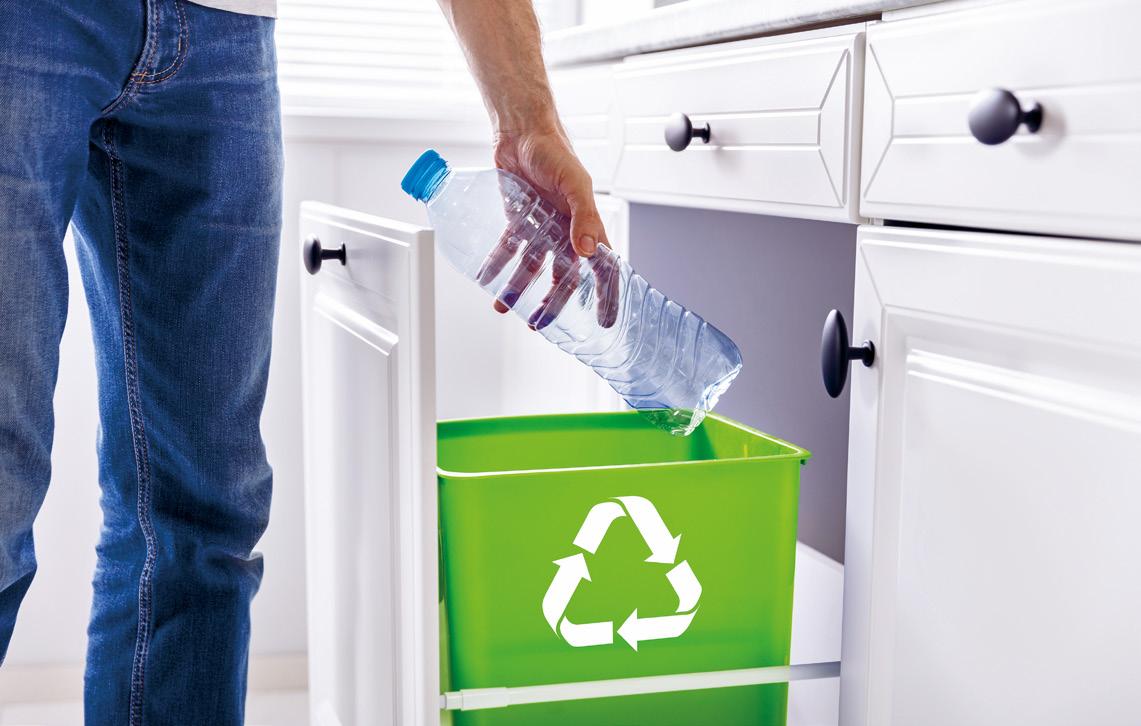
14 minute read
BIG BRANDS + FOSSIL FUEL INDUSTRY USE RECYCLING AS A SMOKESCREEN
BIG BRANDS AND THE FOSSIL FUEL INDUSTRY USE RECYCLING AS A SMOKESCREEN
It is clear that plastics recycling cannot resolve the plastic pollution problem and is being used as a smokescreen by industry to divert attention away from the systemic changes that are needed. Globally, as of 2015, only 9% of all plastic waste ever created had been recycled.98
Advertisement
One study estimated that less than 1% of plastic has been recycled more than once.99 The vast majority of plastic packaging ends up either “downcycled” into lower-grade products or in a landfill, in the environment or incinerated.100 One analysis reported the 2018 U.S. domestic plastic recycling rate at just 2.2%,101 and similarly abysmal rates can be found around the world. Recent Greenpeace USA research shows that much of the plastic packaging used by food and beverage companies in the U.S. has so little chance of being recycled by municipal systems that the “recyclable” labels on the products in question appear not to meet the legal requirements for such claims, putting the companies at risk of legal challenge for deceptive marketing.102
To take one company-specific example, in 2020 Mondelēz reported to the Ellen MacArthur Foundation that 93% of its total packaging, including a significant proportion of its plastic packaging, was “designed for the future of recycling,” but conceded that most of its plastic packaging “is not currently recycled ‘in practice and at scale’ as is required to be considered recyclable under the [Foundation’s own] Global Commitment103 definition” – in fact, the proportion that actually met that definition was a mere 2%.104 Mondelēz also makes the 93% recyclability claim on its website but without clarifying that in reality just 2% of its plastic packaging is actually recyclable.105
Some types of packaging are effectively unrecyclable because of their design – for example, sachets and pouches that typically consist of layers of different materials (also known as “flexibles”).106 These are widely used in the global North for products from snacks to pet food, and are ubiquitous in India and parts of Southeast Asia as a means of marketing personal care and other products, especially to low-income households.107 Though Unilever claims to have developed a process to recover the polyethylene (the main constituent) from such sachets, this has not been proved commercially viable.108 Another flexible waste recycling project (Materials Recovery for the Future) has found collected material to be of insufficient quality for like-to-like recycling.109 Regardless of the technological shortcomings, the logistics and economics of collecting flexible plastic waste make its recycling unviable at scale.
“Chemical recycling” is the next act of a decades-long effort by the fossil fuel and consumer goods industries to convince the public that recycling can mitigate the massive environmental costs of single-use plastic despite overwhelming evidence to the contrary.
Currently, commercial-scale technologies promoted by industry as “chemical recycling” or “advanced recycling” involve one of two related “plastic-to-fuel” processes: gasification and pyrolysis. Both use heat to break down the polymer, not into its constituent monomers, but respectively into either a hydrogen-rich gaseous mixture called “syngas” or a cocktail of various gaseous and liquid hydrocarbons. While either of these outputs can then in theory be further processed to create olefin monomers from which new plastic can be produced, in practice they tend not to be of sufficient quality.110 They can more readily be refined into fuel111 – which is then burned with the emission of just as much GHG as the equivalent conventional fossil fuel,112 making nonsense of the “recycling” claim. The fact that the U.S. petrochemical sector’s front organization, the American Chemistry Council (ACC), in arguing for light-touch regulation of chemical recycling, states that “Advanced recycling facilities … receive plastic feedstock that is converted to valuable fuels and petroleum products” and that “regulations should identify companies that manufacture fuels and petroleum products from post-use plastics feedstock as producers of alternative energy”113 shows clearly where the industry’s priorities lie. One major pyrolysis proponent, Dow Chemical, has even admitted to the National Recycling Coalition that its program “is not recycling.”114
Moreover, even when the output of plastic-to-
fuel plants is further processed into new plastic, the energy-intensive multi-stage process entails high GHG
emissions. Studies have exaggerated plastic-to-fuel’s
MYTH
REALITY
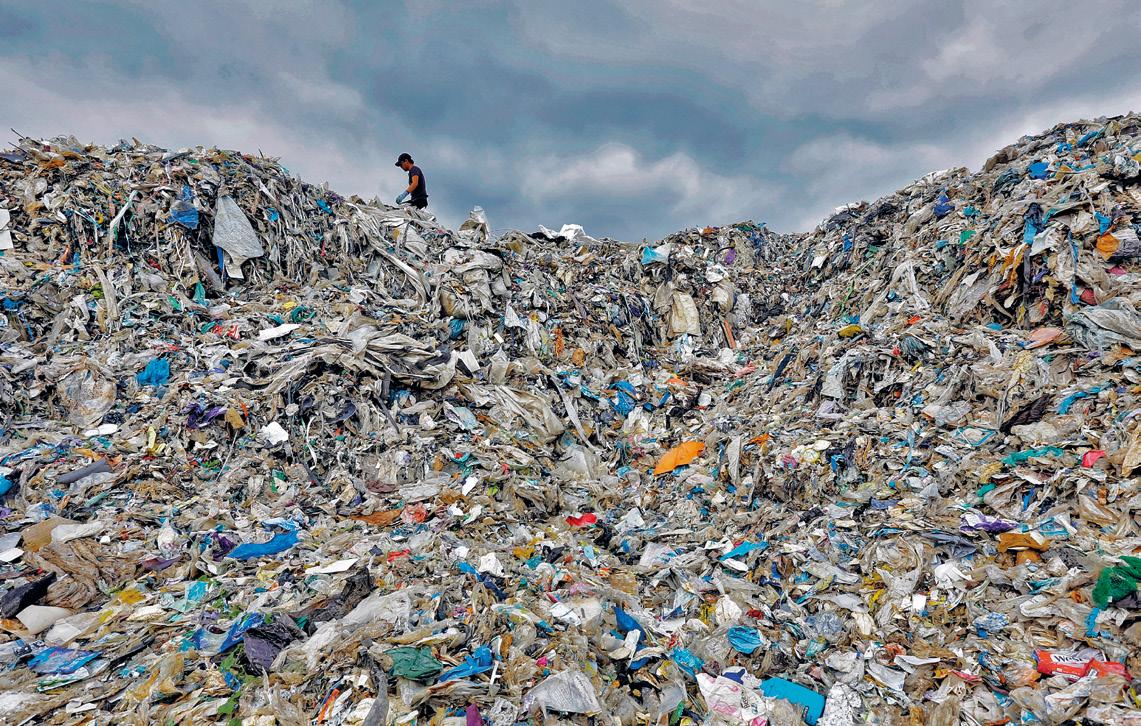
©Shutterstock
Between January and July 2018, Malaysia imported 754,000 metric tons of plastic from countries including the United States, Japan, UK, Australia, New Zealand, Finland, France, Belgium, Germany, Spain, Sweden and Switzerland.© Nandakumar S. Haridas / Greenpeace
emissions performance by assuming that the plastic processed would otherwise have been incinerated and subtracting the corresponding emissions,115 and by arguing that the pyrolysis process can generate most of its own energy, though this is only made possible by burning some of the hydrocarbons produced in the process – effectively incinerating a percentage (often a considerable one) of the waste plastic feedstock. Thus the less external energy input the plant uses, the greater the GHG emissions from the plant itself and the lower its output of olefins.116
When gasification uses municipal solid waste as a feedstock, its global heating potential is up to seven times that of virgin plastic production if “avoided emissions”
from waste incineration are ignored.117 The oil produced by pyrolysis is so impure that it can only be cracked to make olefins if it is first subjected to energy- and carbon-intensive purification, or mixed with a much larger quantity of virgin feedstock, further undermining the technology’s low-carbon pretensions. Moreover, pyrolysis and gasification emit carcinogens and other toxins.118
Finally, the economics of “chemical recycling” appear not to be viable without heavy government subsidies due to the low value of the recovered feedstock.119 It is therefore unsurprising that, according to the ACC’s own figures, shale gas-driven investment in U.S. petrochemical facilities is currently outpacing investment in “chemical recycling” by over 12 to 1.120 Rather than limiting plastic production, “chemical
recycling” appears if anything to be providing an excuse
to increase it.121 In any case, as with mechanical recycling, it would not be in the fossil fuel industry’s interest for “chemical recycling” to be so successful that it began to threaten virgin plastic production.122 Furthermore, the need to earn a return on the capital investments in facilities using such technologies will necessitate a steady plastic waste stream, and so could be used to justify a ramping up of virgin plastic output.
Despite the failures of plastic recycling, FMCG companies have been working in partnership with the fossil fuel, petrochemical and packaging sectors to promote recycling, oppose legislation that would restrict single-use packaging and/or adopt so-called “chemical recycling” as part of their “circular economy” commitments.
The petrochemical industry has been aware of doubts about the economic viability and technical limitations of recycled plastic for decades.123 Initially oil companies set up their own recycling projects, but more recently the industry has relied on targeted investment in existing local infrastructure and research and development,124 along with lobbying for public-sector investment.125 At the end of the 1980s industry players also began a successful lobbying campaign to persuade state legislatures that the international recycling symbol should be made mandatory on all plastic packaging. By this means, industry largely
succeeded in convincing the public that all plastic is recyclable and thus environmentally acceptable,
protecting its highly profitable core business of selling virgin, non-recycled plastic.126 Though there is growing public skepticism as to whether material of all kinds sent for recycling is actually recycled, and confusion around plastic recyclability, recycling participation rates remain high.127
Despite knowing the economic and technical shortcomings of plastic recycling, the fossil fuel/petrochemical sector and FMCG companies frequently collaborate to promote recycling as the primary solution to the plastic crisis and lobby against restrictions on single-use plastic. Such alliances can trace their inspiration back to Keep America Beautiful, an organization set up in the 1950s to promote the idea that litter was consumers’, not companies’, responsibility – and still going strong today with board membership including BlueTriton Brands (formerly Nestlé Waters North America128), Mars, PepsiCo and Dow Chemical.129 In the late 1980s, faced with the threat of anti-plastic legislation at the state and even federal level, the U.S. plastic industry reportedly embarked on a multimillion-dollar PR campaign.130 The industry front group Society of the Plastics Industry (later to become the Plastics Industry Association, or PLASTICS131) set up the Council for Solid Waste Solutions,132 which reportedly involved fossil fuel and plastic companies, including Amoco, Chevron, Dow, DuPont, Exxon and Mobil, as well as FMCG major Procter & Gamble.133 Even though many in the industry had long been aware that the economic and technical viability of plastic recycling was doubtful,134 the Council, the Society and the wider industry proceeded to campaign successfully across the U.S. to avert the threat of restrictions on plastic packaging by promoting recycling.135 Companies including Amoco and Mobil even set up short-lived recycling projects themselves,136 although the public sector soon began to shoulder most of the cost of plastic recycling.137
In a 2020 investigative report by the National Public Radio, Larry Thomas, former president of PLASTICS, underscored the apparent intent behind the industry’s recycling playbook, saying “If the public thinks that recycling is working, then they are not going to be as concerned about the environment.” Thomas continued, “You know, they were not interested in putting any real money or effort into recycling because they wanted to sell virgin material. Nobody that is producing a virgin product wants something to come along that is going to replace it. Produce more virgin material — that’s their business.”138
A newer front group pushing a similarly disingenuous message is the Alliance to End Plastic Waste, formed in 2019 – this time with the involvement of two FMCG majors, PepsiCo and Procter & Gamble, alongside dozens of fossil fuel and plastic companies.139 The Alliance sponsors projects aiming to improve recycling infrastructure and develop “chemical recycling” technologies,140 but has yet to announce any significant achievements. Its highly publicized project with Renew Oceans
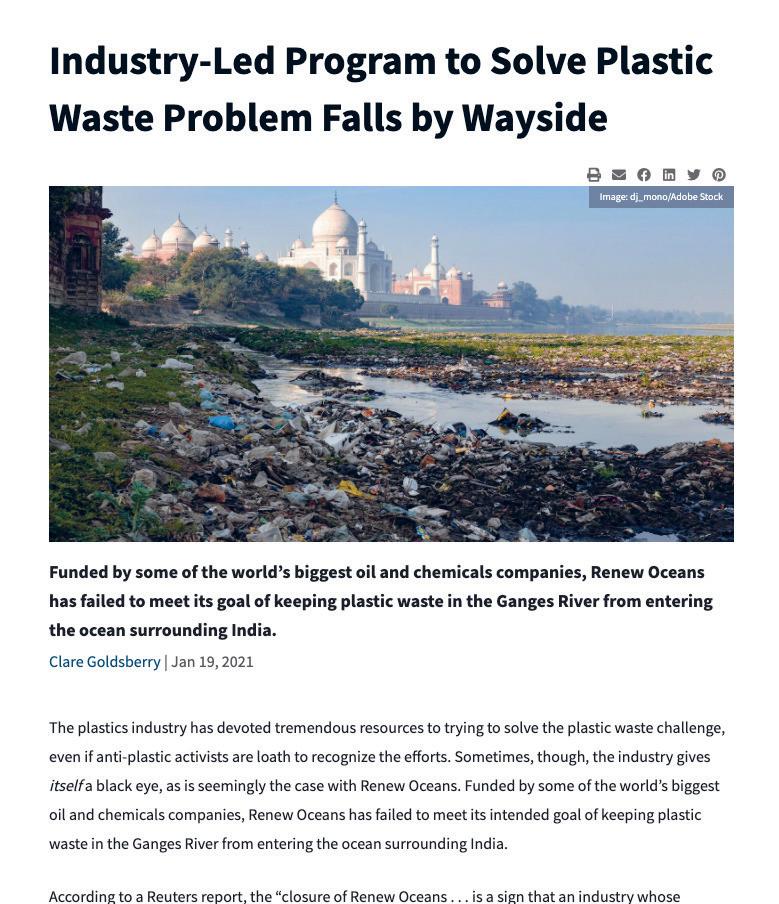
The Alliance to end Plastic Waste’s apparent enthusiasm for recycling is matched only by their member’s commitment to fossil fuel extraction and single use plastic production.
The Alliance sponsors projects aiming to improve recycling infrastructure and develop technologies, but has yet to announce any significant achievements. Instead, its highly publicised project with Renew Oceans to recycle plastic waste from India’s River Ganges recently closed after allegedly collecting just one ton of waste
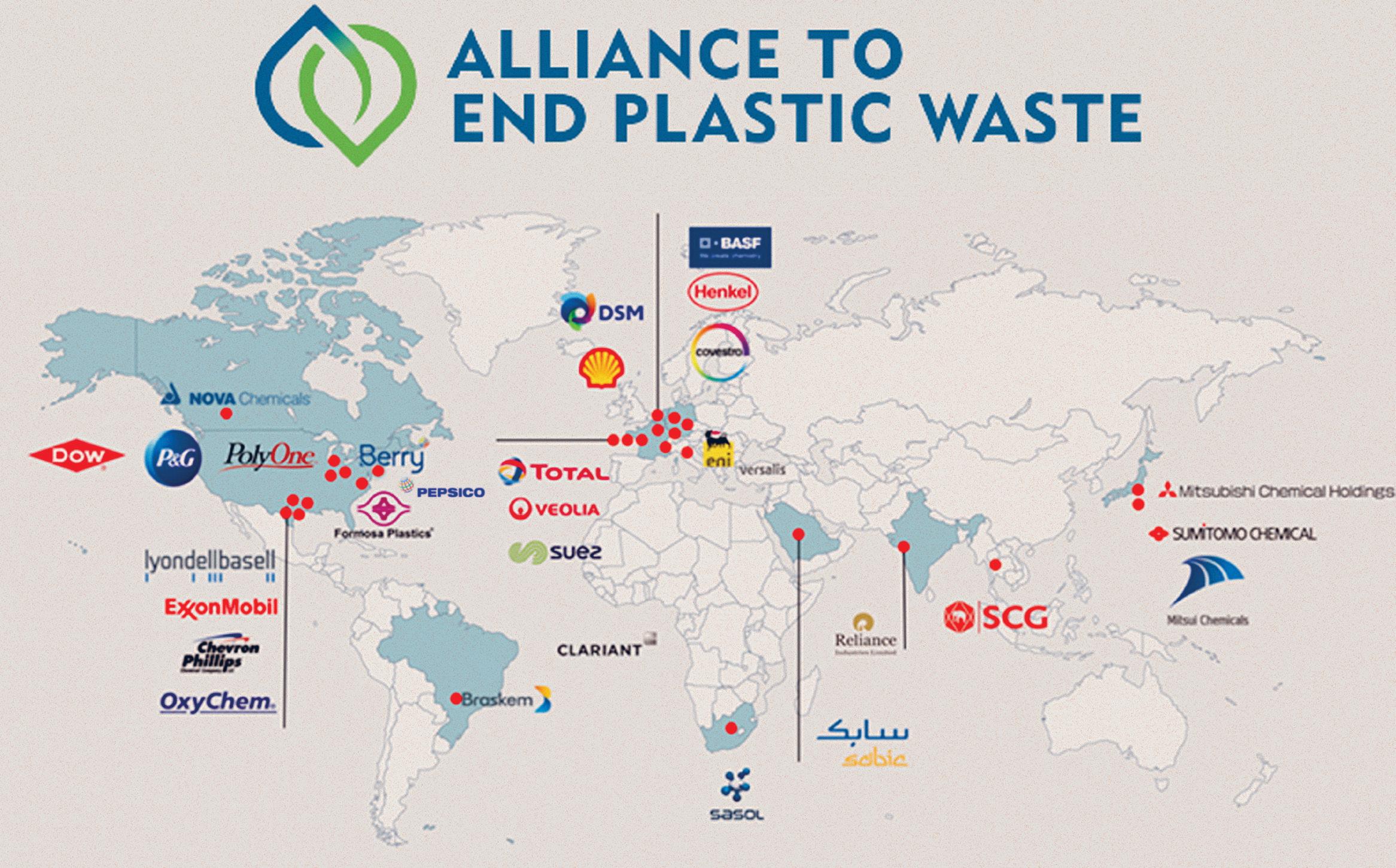
to recycle plastic waste from India’s River Ganges recently closed after allegedly collecting just one metric ton of waste.141 The Alliance’s status as a charity obscures the fact that it was set up as a project of the ACC,142 which represents nearly 150 chemicals, plastic and packaging companies.143 The ACC itself was an early opponent of anti-plastic bag laws,144 spending more than $9m between 2007 and 2010 on obstructing bans in California and Seattle alone.145
Other ACC front groups include the misleading Wrap Recycling Action Program, which encourages U.S. consumers to drop off wrappers, bags and flexible packaging at stores, even though they will mostly end up being downcycled – if they are recycled at all;146 and Materials Recovery for the Future (MRFF), a research initiative whose FMCG members and supporters include Johnson & Johnson, KraftHeinz, Mars, Mondelēz, Nestlé, PepsiCo, Procter & Gamble, SC Johnson, Unilever and Walmart.147 MRFF is supposedly aiming to pioneer recycling of post-consumer flexible packaging, but in practice appears focused mainly on downcycling opportunities.148
Most recently the ACC has lobbied the U.S. government to oppose anti-plastic legislation in Kenya in order to expand U.S. export markets,149 was an early opponent of domestic plastic bag laws (through its front organization the Progressive Bag Alliance)150 and has promoted so-called “advanced recycling.”151 At the same time it has pledged to ensure that all plastic packaging is “re-used, recycled or recovered” – but not until 2040,152 a date hardly consistent with the 45% global emissions cut needed by 2030 to keep within the 1.5 °C barrier.153
The Society of the Plastics Industry’s successor, PLASTICS, has continued to lobby across the U.S., along with the ACC, successfully pressuring state legislators to introduce preemptive laws against plastic bans.154 PLASTICS does not disclose its membership, although Coca-Cola, PepsiCo and SC Johnson are known to have been members until they left in 2019 following public pressure.155 FMCG companies, including PepsiCo and Unilever, have joined with the ACC, PLASTICS and others in supporting the US RECOVERY Bill, which proposes a $500m boost for recycling while restricting funds for incineration – but does not address the need to reduce single-use plastic production.156 The Recycling Partnership, with members including PepsiCo, Colgate-Palmolive, Nestlé and Procter & Gamble, as well as the ACC,157 is reportedly pursuing a similar agenda, calling for investment in recycling while failing to support the introduction of state-level legislation requiring refundable deposits on plastic bottles (even though such legislation and the resultant collection infrastructure have been shown to increase collection rates massively).158 Such lobbying activity is not confined to the U.S.: Coca-Cola, Danone, L’Oréal and Nestlé, along with a number of plastic and packaging companies including Alpla and Greiner, are members of an Austrian group called Packaging With a Future159 which encourages reliance on plastic packaging160 and has opposed the introduction of minimum quotas for the proportion of reusable packaging sold by retailers.161
In addition to joint lobbying, FMCGs have been partnering with fossil fuel companies to push “chemical” or “advanced recycling” to justify their continued
reliance on single-use plastic. One FMCG major, Procter & Gamble, has even developed its own process to purify and recycle contaminated polypropylene using a gas solvent.162 It has licensed this to a company called PureCycle,163 which has in turn partnered with Nestlé to develop new packaging164 and signed a supply agreement with L’Oréal.165 It has also partnered with two FMCG packaging suppliers: petrochemical giant Total, with which it has a strategic partnership encompassing a U.S. supply agreement and a commitment to explore the feasibility of a plant in Europe;166 and packaging company Aptar, with which it has formed a product development partnership.167 In May 2021, a class action lawsuit was filed alleging PureCycle executives made false and misleading statements, including overstating the effectiveness of the company’s technology.168
Coca-Cola,169 Danone,170 L’Oréal171 and PepsiCo172 all signed supply agreements for recycled bottles with Loop Industries, a Canadian startup developing a new lowheat, pressureless depolymerization project in partnership with plastics giant Indorama.173 The company claimed the process could produce virgin-quality, food-grade PET resin from inputs “of any color, transparency or condition,” including ocean-degraded plastic.174 As of 2020, PepsiCo and L’Oréal were still citing their involvement with Loop (described in PepsiCo’s case as a “partnership”) as evidence of their environmental commitments.175 However in late 2020 Loop faced accusations from investment research firm Hindenburg that it had grossly exaggerated the efficacy and financial viability of its technology.176 Two weeks later, Coca-Cola canceled its agreement with Loop after the company failed to deliver by the agreed date.177 Soon afterward an “independent review” commissioned by Loop apparently confirmed the technical viability of its process,178 but Hindenburg responded by pinpointing numerous flaws in the review’s scientific methodology and noted that in any case its failure to address questions concerning the process’s yield and economic viability made it “largely meaningless.”179 Loop is now facing a classaction lawsuit alleging securities fraud.180
While Loop was at least purporting to offer a plasticto-plastic technology, FMCG companies have also partnered with fossil fuel and technology companies to develop pyrolysis (“plastic-to-fuel”) plants – for example, Mars and Nestlé with Total and Recycling Technologies.181 Buyers of pyrolysis-derived plastic from Saudi Aramco subsidiary SABIC’s TruCircle range182 include Unilever, which has used it for its Knorr183 and Magnum184 brands, and Mars, which has begun to use it in pet food packaging.185 Procter & Gamble has announced it will use chemically recycled resin from Indorama.186

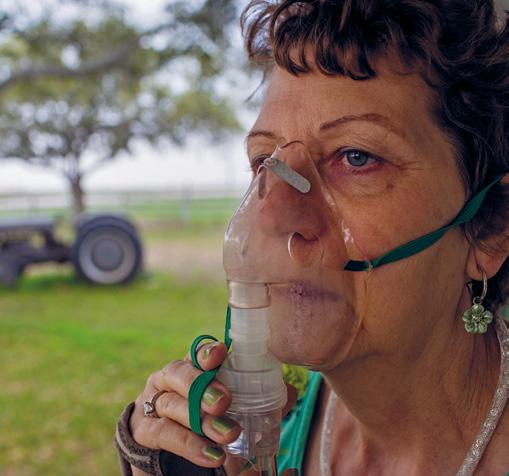
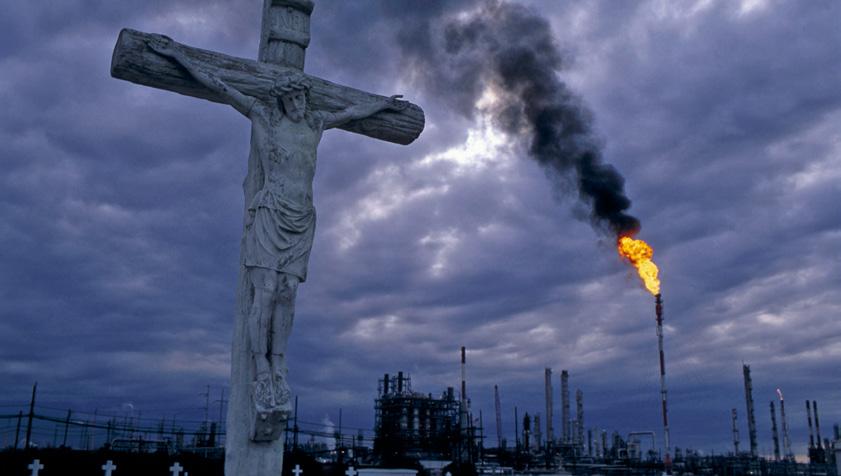

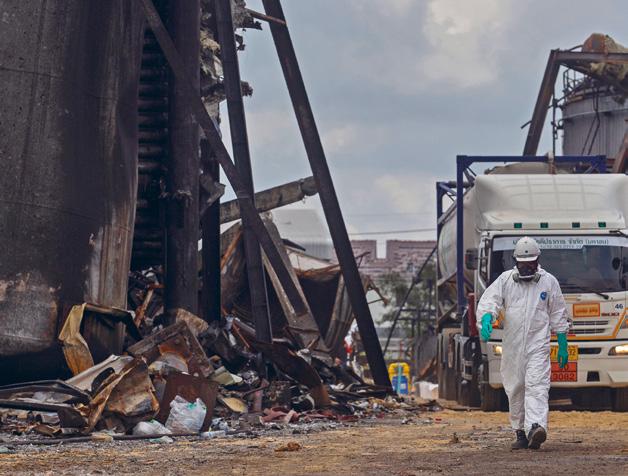
E
A 2 June 2018. Youngsville, Louisiana, USA. Melinda
Tillies watching the installation of the Bayou
Bridge Gas Pipeline next to her home. © Julie Dermansky / Greenpeace B 19 March 2015. Karnes County, Texas, USA.
Lynn Buehring lives near three different hydrofracking wells, flaring since 2011. She suffers from severe reactions to the chemicals and hydrogen sulfide (H2S) gas released from the wells. © Les Stone / Greenpeace C 15 January 2001 Cemetery next to the Taft Carbide
Plant in Lousiana. © Les Stone / Greenpeace D 10 July 2021 © Thailand. Explosion at expanded polystyrene (EPS) factory Ming Dih Chemical on 5 July affecting residents in Samut Prakan area. The Factory has since been told by the
Thai Industry Ministry to relocate to a less populated location E 10 July 2021. Thailand. Explosion at expanded polystyrene factory Ming Dih Chemical on 5 July severely damaged the facility. D and E © Greenpeace / Chanklang Kanthong










